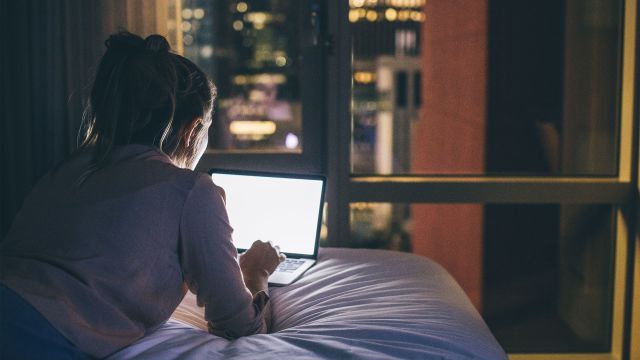If you find yourself nodding off at 10 p.m. despite your best efforts to stay awake, or routinely opening your eyes at 7 a.m.—even on mornings when you could sleep in—you have your circadian rhythm to thank. This self-sustaining 24-hour internal body clock responds to daylight and darkness to tell us when it’s time to be sleepy and when we should be fully awake. Fending off these messages is tough. Your rhythm is based on a roughly 24-hour day, and once it’s there, it can be hard to shift.
Circadian rhythms are determined mainly by genetics, but they’re also influenced by external factors, such as exercise, meal times, sleep deprivation and exposure to artificial light, particularly the glow emitted by smartphones, tablets and computer screens. Your environment or lifestyle can derail your internal clockwork, which, in addition to sleep, helps regulate your metabolism, blood pressure, body temperature, and hormone levels.
When you stay up too late, sleep too little or constantly change your sleep–wake schedules, you’re disrupting your body’s natural circadian rhythms. This can not only leave you feeling tired or groggy during the day, but also have longer term health consequences.
Learning more about circadian rhythms and how they can be disrupted could help you sleep more soundly and improve your overall quality of life.
How circadian rhythms work
Circadian rhythms are controlled by "clock genes" that code for certain proteins. Many different types of cells throughout the body have their own internal clock, but the “master clock” that regulates these 24-hour cycles (and helps control a number of processes in the body through hormones and the nervous system) is found in the hypothalamus—the part of the brain that helps regulate body temperature and appetite as well as sleep and emotions.
Your body clock helps keep you asleep throughout the night and helps you feel wakeful during the day. Light is one of several external factors that can affect circadian rhythms. Minus some midafternoon energy dips after lunch, it keeps the awake messages coming, while darkness brings on that familiar sleepy feeling.
When it’s dark, the hypothalamus sends a signal to the nearby olive-shaped pineal gland. Once this gland receives the “it’s dark” message,” it releases the hormone melatonin, which makes you sleepy. The result? Mentally, your mind starts tucking itself in for the night. Then, as sunrise approaches, your melatonin levels should naturally drop, letting you know it’s time to wake up and start a new day.
So, what is a normal sleep-wake cycle? This really varies from one person to the next. Some people naturally prefer to get to bed early and rise with the sun, while others, including so-called “night owls,” tend to be most alert or energetic later in the day.
Typically, in modern-day work week, “normal” is going to sleep at around 10 or 11 p.m. and waking up at around 6 or 7 a.m., according to Ali Najar, MD, a sleep medicine specialist at St. Joseph Mercy Oakland in Auburn, Michigan. Rapidly changing your sleep-wake routine—like staying up extra late on weekends, thinking we’ll just sleep in—“goes against our fundamental biology” and should be avoided, if possible, cautions Dr. Najar.
Why your body clock may be out of sync
Circadian rhythms are powerful, but they’re not set in stone. They can adapt to a new schedule over time. But if you’re constantly changing your sleep patterns, you’re not allowing your internal body clock to adequately adjust. Shift work that involves a rotating schedule, staring at a bright screen until the wee hours and abruptly changing time zones are all ways you could throw your body clock out of whack.
The body’s sleep-wake cycle is complex so its disruption can trigger a cascade of effects. For example, adenosine, a naturally occurring chemical that plays a role in why you feel drowsy, may build up if you’re sleep deprived. Your melatonin levels may also rise and fall at the wrong times, leaving you drowsy when you’re trying to work or alert when you’re trying to sleep.
Keep in mind there are some circadian rhythm disrupters that you can’t control, such as getting older. As you age, the way your body responds to body clock messages changes. As time passes, you may find yourself sleeping less and waking more often—even in the dark. Your ability to sleep soundly can also be disrupted by the hot flashes of menopause or underlying health issues, such as arthritis pain or migraine.
Sleep apnea, which occurs when breathing is repeatedly interrupted during sleep, and insomnia, a distressing inability to fall and stay asleep, are two sleep disorders that can disrupt your sleep-wake cycle, according to Najar. These conditions, jet lag, aging, and shift work are the most common disrupters, but researchers have realized that certain sleep-wake disorders also affect circadian rhythms.
Disorders of the circadian rhythm
Young people can have what’s called delayed sleep-wake phase disorder, in which they tend to go to bed and wake up later than what is considered normal or than they’d like. It’s unclear what causes this disorder, but it may be related to developmental changes, ultra-sensitivity to light at night and other environmental factors.
On the opposite end of the spectrum, older people tend to have advanced sleep-wake phase disorder, in which age-related weakening of their circadian rhythms cause them to wake up much earlier than normal, or than they’d prefer.
There are other sleep-wake conditions that typically affect people who are blind (non-24-hour sleep-wake rhythm disorder) and those with dementia or other neurodegenerative diseases (irregular sleep-wake rhythm disorder).
How sleep-wake disorders are diagnosed
To determine whether or not a person’s problems meet the threshold for a sleep disorder, the first step is to keep a sleep diary, Najar explains. The patient records their sleep patterns for a couple of weeks, and clinicians then use that as a tool to find out what kind of sleep disorder, if any, is present. Another tool is actigraphy, a device (usually a wrist wearable) that automatically tracks a person’s sleep-wake patterns.
What therapies are available if your doctor identifies a problem? Depending on the disorder, treatment may include carefully managing set sleep and wake times.
Melatonin supplements and light therapy may also be recommended, says Najar. The two approaches have opposite effects. Taking melatonin an hour before the target bedtime in the evening will help shift sleepiness to an earlier time. Exposure to bright light will have the opposite effect, promoting alertness. Be sure to talk to your doctor before taking melatonin for any reason to ensure it’s safe and appropriate for your situation.
Practicing good ‘sleep hygiene’
For those with a sleep-wake rhythm disorder, their sleep hygiene, or certain habits and behaviors that promote quality sleep and keep your body clock running smoothly, will also be examined. It’s important for everyone—even those without a sleep disorder—to have healthy sleep habits.
This includes creating a clean path to sleep, advises Najar. It’s important to avoid exposure to stimulating artificial lights—particularly the blue light emitted by many electronic devices, such as smartphones and tablets—which can suppress melatonin production and keep you awake. This light-based mind clutter includes late-night TV binges. So, best to remove electronics from your bedroom and avoid streaming a new Netflix series until 2 a.m.
It’s also a good idea to avoid lengthy naps and to get outside during the day. Greater exposure to sunlight can help you realign your body clock. A 2015 study published in Chronobiology International found that not getting enough natural light exposure during the day is associated with lower levels of melatonin and higher levels of the stress hormone cortisol at night (this should be the case in the morning when people are waking up).
As bedtime approaches, steer clear of alcohol and stimulants, such as caffeine. Establishing a relaxing bedtime routine can also help prepare your mind and body for sleep. This may include taking a warm shower or bath, reading a book and keeping your bedroom cool, quiet and dark.
How shift workers can adapt
Of course, some professions require shift work, with its odd schedules that constantly switch up sleep-wake cycles. This type of rotating shift work—and the resulting disruption of circadian rhythms—has been associated with serious health consequences, including an increased risk for obesity, type 2 diabetes, depression, multiple sclerosis, heart disease and cancer.
Still, there are jobs that require people, such as doctors, nurses, pilots, police officers and flight attendants, to work nights. There are strategies that these and other shift workers could use to minimize some of the drowsiness caused by disruptions to their 24-hour body clock.
“We recommend taking a brief nap at nighttime during the shift work, not lasting more than 15 minutes,” Najar adds. If the napping goes on longer, grogginess may become a problem.
Adding in some light therapy, which involves deliberate exposure to very bright light that should end two hours before a shift can help mitigate the drawbacks of shift work, he notes. The U.S. Food and Drug Administration has approved the use of modafinil (brand name, Provigil) for shift workers to help them stay alert, Najar points out, but caffeine is another option.
Keep in mind, coping with shift work won’t necessarily reduce the health risks associated with chronic disruptions of your circadian rhythms. If you struggle with daytime sleepiness, disrupted sleep or if you’re having trouble adjusting to rotating shift work, talk to your doctor about the lifestyle adjustments and possible treatment options that may be right for you.






